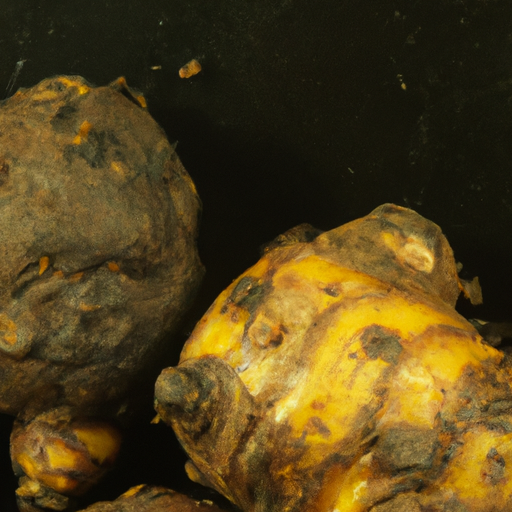As a fan of using natural remedies in my everyday life, turmeric has become a must-have in my kitchen. I enjoy incorporating it into my meals or making a soothing cup of turmeric tea for its potential health benefits. However, it’s crucial to be aware of the possible side effects and risks that come with consuming turmeric, just like any other supplement or herb.
In this article, I will provide an overview of turmeric and its active compound, curcumin, and discuss the potential side effects, who is at risk, and precautions to take when consuming turmeric tea. I will also touch on allergic reactions and interactions with other herbs, supplements, and medications, as well as provide some turmeric tea recipes and tips to help minimize any potential risks.
Let’s dive in and explore the potential side effects of turmeric tea.
Key Takeaways
- Excessive consumption of turmeric tea may cause digestive discomfort and skin irritation.
- Turmeric tea may stimulate the production of gastric acid, leading to acid reflux and heartburn.
- Individuals with a history of liver disease or gallbladder problems should avoid consuming large amounts of turmeric tea.
- Pregnant women should use caution when consuming turmeric tea and start with small amounts to avoid negative side effects.
Overview of Turmeric and Curcumin
You may already know that turmeric and curcumin are often used interchangeably, but it’s important to understand that curcumin is actually just one of the many beneficial compounds found in turmeric.
Turmeric has been used for its medicinal properties for thousands of years, particularly in Ayurvedic and traditional Chinese medicine. In fact, turmeric has been used for everything from improving digestion and reducing inflammation to treating skin conditions and even promoting overall longevity.
Beyond its medicinal benefits, turmeric also has a rich history in culinary arts. Its vibrant yellow color and earthy flavor make it a popular spice in many traditional dishes, particularly in Indian and Middle Eastern cuisines. Whether you’re enjoying a delicious curry or sipping on a warm cup of turmeric tea, there’s no denying that this spice has a lot to offer.
However, it’s important to keep in mind that as with any substance, there may be potential side effects to be aware of.
Potential Side Effects
If you consume turmeric tea excessively, it may cause digestive discomfort and skin irritation. Some people may experience bloating, gas, or stomach cramps after drinking turmeric tea. This is because turmeric can stimulate the production of gastric acid, which can lead to acid reflux and heartburn.
Additionally, turmeric contains oxalates, which can contribute to the formation of kidney stones in susceptible individuals. In rare cases, turmeric tea may also cause skin reactions. Contact dermatitis can occur if turmeric comes into direct contact with the skin, causing redness, itching, and blistering.
This is more likely to happen if you have sensitive skin or if you use turmeric topically as a skincare treatment. Before using turmeric tea for any therapeutic purpose, it’s important to talk to your doctor or a qualified healthcare provider to make sure it’s safe for you to consume. Who’s at risk for these side effects? Let’s find out in the next section.
Who is at Risk?
It’s important to know who may be more susceptible to the potential risks associated with consuming turmeric tea. Personal habits and genetic predisposition can play a role in how an individual reacts to the tea.
For example, individuals who have a history of liver disease or gallbladder problems may want to avoid consuming large amounts of turmeric tea as it can exacerbate these conditions. Additionally, those who are taking blood thinners or have a bleeding disorder should consult with their healthcare provider before consuming turmeric tea as it can increase the risk of bleeding.
Furthermore, individuals who have a sensitivity or allergy to turmeric may experience adverse reactions such as hives, rash, or difficulty breathing. It’s important to note that these risks are not limited to turmeric tea and can also occur with the consumption of other turmeric-containing products.
Therefore, it’s crucial to be aware of personal habits and genetic predisposition when considering the consumption of turmeric tea. Moving forward, it’s essential to understand the appropriate dosage and precautions to take when consuming turmeric tea.
Dosage and Precautions
To tread carefully when consuming turmeric tea, it’s crucial to follow the recommended dosage and take necessary precautions to ensure a safe and enjoyable experience. Here are some dosage recommendations and precautions for consumption:
-
Start with small amounts: It’s recommended to start with small amounts of turmeric tea, such as half a teaspoon, and gradually increase the amount to avoid any negative side effects.
-
Avoid consumption with certain medications: Turmeric tea may interact with certain medications, such as blood thinners, and should be avoided if you’re taking them.
-
Use caution during pregnancy: Pregnant women should use caution when consuming turmeric tea as it may stimulate the uterus and potentially cause complications.
-
Consult with a healthcare provider: If you have any concerns about consuming turmeric tea, it’s always best to consult with a healthcare provider to ensure it’s safe for you.
Following these dosage recommendations and precautions can help ensure a safe and enjoyable experience when consuming turmeric tea. However, allergic reactions are still possible and should be taken seriously.
Allergic Reactions
Allergic reactions can still occur even when consuming turmeric tea in recommended amounts and with precautions in place. Some individuals may be hypersensitive to turmeric or its active ingredient, curcumin. Common symptoms of an allergic reaction include skin rash, itching, hives, swelling of the face or throat, shortness of breath, and wheezing. In rare cases, anaphylaxis, a severe and potentially life-threatening allergic reaction, may occur.
If you experience any of these symptoms after consuming turmeric tea, seek medical attention immediately. Treatment may involve managing symptoms with antihistamines or corticosteroids. In severe cases, emergency response measures, such as epinephrine injections, may be necessary.
It’s important to note that most people can safely consume turmeric tea without experiencing any adverse effects, but if you have a history of allergies or are unsure if you’re allergic to turmeric, consult with a healthcare professional before consuming it.
As we move on to the next section about interactions with other herbs and supplements, it’s important to keep in mind the potential for allergic reactions when using turmeric tea. It’s also important to be aware of the potential for interactions between turmeric tea and other herbs or supplements, which we’ll explore in the following section.
Interactions with Other Herbs and Supplements
Did you know that mixing certain herbs and supplements with your turmeric tea could potentially have negative consequences on your health? While turmeric is generally safe, it is important to be cautious when combining it with other herbs and supplements. The interaction between turmeric and other substances can affect the way your body absorbs nutrients and lead to unwanted side effects.
Some of the herbs that may interact with turmeric include garlic, ginger, and ginkgo biloba. These herbs have blood-thinning properties and may increase the risk of bleeding when taken with turmeric. On the other hand, supplements such as black pepper and omega-3 fatty acids can enhance the absorption of turmeric and increase its effectiveness. It is important to consult with a healthcare professional before taking any herbs or supplements in combination with turmeric to avoid any potential adverse effects.
Moving on to the next section, it is also important to consider the interaction between turmeric and medications.
Interaction with Medications
You might be surprised to learn that combining certain medications with turmeric can create a dangerous cocktail that could literally knock you off your feet. Turmeric has been shown to interact with several medications, including blood thinners, anti-inflammatory drugs, and diabetes medications.
Here are some of the medication interactions you should be aware of when consuming turmeric:
- Turmeric may increase the risk of bleeding when taken with blood thinners like warfarin.
- Turmeric may enhance the effects of anti-inflammatory drugs like aspirin and ibuprofen, increasing the risk of bleeding and stomach ulcers.
- Turmeric may interfere with the absorption of certain diabetes medications, leading to high blood sugar levels.
- Turmeric may interact with chemotherapy drugs, reducing their effectiveness.
- Turmeric may interact with some antidepressants, causing excessive bleeding.
To minimize the risk of adverse effects when taking turmeric with medications, it’s important to consult with your doctor or a healthcare professional beforehand. They can advise you on any potential turmeric contraindications and recommend strategies to reduce your risk of complications.
How to Minimize Risk
To reduce the chance of complications, it’s important to consult with a healthcare professional before combining turmeric with any medications. Your healthcare provider can advise you on how to adjust your medication regimen or dosage to minimize the risk of harmful interactions.
Although turmeric tea is generally considered safe, it can interact with certain drugs, including blood thinners, anti-inflammatory medications, and diabetes medications.
When it comes to making turmeric tea, there are many benefits and variations to consider. Some people prefer to use fresh turmeric root, while others prefer the convenience of pre-packaged tea bags. You can also add other ingredients, such as ginger, cinnamon, honey, or lemon, to enhance the flavor and potential health benefits.
To brew the perfect cup of turmeric tea, start by heating water to boiling point and adding turmeric and any other desired spices to the water. Then, allow the mixture to steep for several minutes before straining and serving. Experiment with different brewing techniques and flavor combinations to find the perfect recipe for your taste preferences and health needs.
In the next section, we will explore more turmeric tea recipes and tips to help you get started.
Turmeric Tea Recipes and Tips
Now that we’ve talked about how to minimize the potential risks of consuming turmeric tea, let’s move on to some helpful tips and recipes.
One of the great things about turmeric tea is that it can be customized to suit individual tastes. There are numerous flavor variations that can be added to the tea to make it more enjoyable, such as adding honey, lemon, or ginger. These additional ingredients not only add flavor but also provide additional health benefits.
When it comes to brewing techniques, there are a few things to keep in mind. First, it’s important to use high-quality turmeric powder to ensure the best flavor and health benefits. Second, the tea should be brewed for at least 10 minutes to fully extract the beneficial compounds. Lastly, it’s important to note that turmeric tea can stain clothing and surfaces, so be sure to take precautions when brewing and consuming the tea.
With these tips in mind, anyone can enjoy a delicious and healthy cup of turmeric tea.
Frequently Asked Questions
Can turmeric tea cure illnesses?
I have found that incorporating turmeric tea into my daily routine has provided numerous benefits, such as reducing inflammation and aiding digestion. There are many delicious turmeric tea recipes available online to try. However, it is important to note that while turmeric tea has many potential benefits, it is not a cure for illnesses. Consult with a healthcare professional before using turmeric tea as a treatment for any specific condition.
Is turmeric tea safe for pregnant women?
When pregnant, I was concerned about drinking turmeric tea. After researching, I found that it’s safe in moderation. Doctors recommend no more than a teaspoon a day and to consult with them first.
Can turmeric tea cause dehydration?
Turmeric tea can cause dehydration risks if consumed in excess, as it has diuretic properties. However, taste preferences can also affect how much you drink. It is important to stay hydrated by drinking plenty of water.
Are there any psychological side effects of drinking turmeric tea?
As someone who has tried turmeric tea, I’ve experienced its mental health benefits like improved mood and reduced stress. However, excessive consumption may cause potential drawbacks like gastrointestinal issues.
Can turmeric tea cause liver damage?
Research evidence suggests that high doses of turmeric may cause liver damage. It is important to monitor liver health when consuming turmeric tea or supplements. Always consult with a healthcare professional before starting any new supplement regimen.
Conclusion
Overall, turmeric tea is generally considered safe for most people, and the potential health benefits may make it worth incorporating into your diet. However, it’s important to be aware of the potential side effects and risks associated with consuming high amounts of turmeric.
One example of the potential risks of consuming high amounts of turmeric is a case study of a woman who developed liver injury after taking daily doses of turmeric supplements. While this is a rare occurrence, it highlights the importance of being cautious when it comes to consuming large amounts of any supplement or herb.
To minimize the risk of side effects, it’s recommended to stick to moderate amounts of turmeric and to talk to your healthcare provider before adding it to your regimen. Additionally, purchasing high-quality turmeric from a reputable source and following recommended dosage guidelines can help reduce the risk of adverse effects.
By being mindful of the potential risks and taking proper precautions, you can safely enjoy the potential health benefits of turmeric tea.










